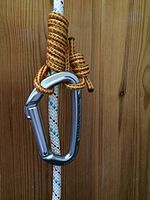List of friction hitch knots
Appearance
This article needs additional citations for verification. (June 2014) |
A friction hitch is a kind of knot used to attach one rope to another in a way that is easily adjusted. These knots are commonly used in climbing as part of single-rope technique, doubled-rope technique and as "ratchets" to capture progress on a moving rope, most typically in a mechanical advantage system such as a Z-drag. These hitches are a simple and cheap alternative to mechanical ascenders.
List of friction hitches
[edit]| Knot | Description | Image | |
|---|---|---|---|
| Adjustable grip hitch | A simple and useful friction hitch, which may easily be shifted up and down the rope while slack. | 
| |
| Autoblock (Machard or French Prusik) | A friction hitch tied around a thicker rope that can slide while unloaded, but locks when loaded. Commonly used to back up belays. Similar to the Prusik only in function. French Prusik is equivalent to bi-directional Machard. | 
| |
| Bachmann hitch | 
| ||
| Blake's hitch | A friction hitch commonly used by arborists and tree climbers as an ascending knot. Blake's hitch is known by some climbers as a Swicero (Suicero) knot or Verones knot. | 
| |
| Distel Hitch | 
| ||
| Ezelius' adjustable grip hitch | A slip and grip knot that gives good grip and has a wide range of use. Functions well on a wide range of rope materials, including slippery types like polyamide (nylon) and high-modulus polyethylene (Dynema™). Attaching cord can be of same or smaller diameter. Grip in one direction. | 
|
|
| Farrimond friction hitch | A quick-release adjustable friction hitch for use on lines under tension. | 
| |
| Gripping sailor's hitch | A secure, jam-proof hitch used to tie one rope to another, or a rope to a pole, boom, spar, etc., when the pull is lengthwise along the object. It is also known as Michoacan/Martin among friction knots used in climbing. | 
| |
| Icicle hitch | A knot that is excellent for connecting to a post when weight is applied to an end running parallel to the post in a specific direction. | 
| |
| Klemheist hitch | A friction hitch tied around a thicker rope that can slide while unloaded, but locks when loaded. Similar to the Prusik. Klemheist knot is a full equivalent to uni-directional Machard. | 
| |
| Knut hitch | A friction hitch used for climbing a rope, not to be confused with the Knute hitch.[1] | 
| |
| Machard Tresse | A mono-directional variant of the common Machard. Tresse, French for braided, indicates a final crossing turn, which increases the hitch's hold and ease of release. | ||
| Michoacan/Martin | A friction hitch tied around a thicker rope that can slide while unloaded, but locks when loaded.[2][3] Similar to the Prusik. Michoacan/Martin is a full equivalent to Gripping sailor's hitch | 
| |
| Pile hitch | The pile hitch is easier to tie than the icicle hitch, and can be tied in the bight without access to either end of the rope. | 
| |
| Prusik or Prussik | A friction hitch or knot used to put a loop of cord around a rope, applied in climbing, canyoneering, mountaineering, caving, rope rescue, and by arborists. | 
| |
| Rolling hitch (Taut-line hitch) | 
| ||
| Schwabisch hitch | A friction hitch tied around a thicker rope that can slide while unloaded, but locks when loaded. Similar to the Prusik | 
| |
| Todd-Kramer hitch | A friction hitch tied around a thicker rope that can slide while unloaded, but locks when loaded. Similar to the Prusik | 
| |
| Valdotain Tresse | Friction knot used to be fixed on a tautline (a taut-rope), also known as a "Valdostano". It is the single cord equivalent of the Machard Tresse (which uses a loop of cord) | 
| |
| Cooper's hitch | Friction knot used primarily instead of the Valdotain Tresse to which it is similar in design and function. |
See also
[edit]References
[edit]- ^ national.sherrilltree.com/site/Climbing_Hitches.pdf
- ^ "History of a Knot". International Guild of Knot Tyers Forum. International Guild of Knot Tyers. Retrieved 25 December 2016.
- ^ "Climbing Friction Knots". ArboristSite.com. Johnson Management, Inc. Retrieved 25 December 2016.